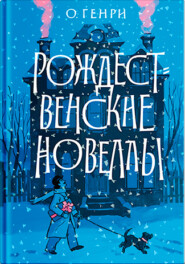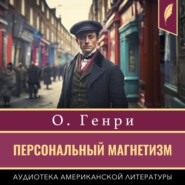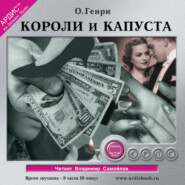По всем вопросам обращайтесь на: info@litportal.ru
(©) 2003-2024.
✖
Strictly Business: More Stories of the Four Million
Настройки чтения
Размер шрифта
Высота строк
Поля
"I've canoed through Canada," said Ives, "down many rapids and over many falls. But I didn't seem to get what I wanted out of it because I knew there were only two possible outcomes – I would either go to the bottom or arrive at the sea level. I've played all games at cards; but the mathematicians have spoiled that sport by computing the percentages. I've made acquaintances on trains, I've answered advertisements, I've rung strange door-bells, I've taken every chance that presented itself; but there has always been the conventional ending – the logical conclusion to the premise."
"I know," repeated Forster. "I've felt it all. But I've had few chances to take my chance at chances. Is there any life so devoid of impossibilities as life in this city? There seems to be a myriad of opportunities for testing the undeterminable; but not one in a thousand fails to land you where you expected it to stop. I wish the subways and street cars disappointed one as seldom."
"The sun has risen," said Ives, "on the Arabian nights. There are no more caliphs. The fisherman's vase is turned to a vacuum bottle, warranted to keep any genie boiling or frozen for forty-eight hours. Life moves by rote. Science has killed adventure. There are no more opportunities such as Columbus and the man who ate the first oyster had. The only certain thing is that there is nothing uncertain."
"Well," said Forster, "my experience has been the limited one of a city man. I haven't seen the world as you have; but it seems that we view it with the same opinion. But, I tell you I am grateful for even this little venture of ours into the borders of the haphazard. There may be at least one breathless moment when the bill for the dinner is presented. Perhaps, after all, the pilgrims who traveled without scrip or purse found a keener taste to life than did the knights of the Round Table who rode abroad with a retinue and King Arthur's certified checks in the lining of their helmets. And now, if you've finished your coffee, suppose we match one of your insufficient coins for the impending blow of Fate. What have I up?"
"Heads," called Ives.
"Heads it is," said Forster, lifting his hand. "I lose. We forgot to agree upon a plan for the winner to escape. I suggest that when the waiter comes you make a remark about telephoning to a friend. I will hold the fort and the dinner check long enough for you to get your hat and be off. I thank you for an evening out of the ordinary, Mr. Ives, and wish we might have others."
"If my memory is not at fault," said Ives, laughing, "the nearest police station is in MacDougal Street. I have enjoyed the dinner, too, let me assure you."
Forster crooked his finger for the waiter. Victor, with a locomotive effort that seemed to owe more to pneumatics than to pedestrianism, glided to the table and laid the card, face downward, by the loser's cup. Forster took it up and added the figures with deliberate care. Ives leaned back comfortably in his chair.
"Excuse me," said Forster; "but I thought you were going to ring Grimes about that theatre party for Thursday night. Had you forgotten about it?"
"Oh," said Ives, settling himself more comfortably, "I can do that later on. Get me a glass of water, waiter."
"Want to be in at the death, do you?" asked Forster.
"I hope you don't object," said Ives, pleadingly. "Never in my life have I seen a gentleman arrested in a public restaurant for swindling it out of a dinner."
"All right," said Forster, calmly. "You are entitled to see a Christian die in the arena as your pousse-café."
Victor came with the glass of water and remained, with the disengaged air of an inexorable collector.
Forster hesitated for fifteen seconds, and then took a pencil from his pocket and scribbled his name on the dinner check. The waiter bowed and took it away.
"The fact is," said Forster, with a little embarrassed laugh, "I doubt whether I'm what they call a 'game sport,' which means the same as a 'soldier of Fortune.' I'll have to make a confession. I've been dining at this hotel two or three times a week for more than a year. I always sign my checks." And then, with a note of appreciation in his voice: "It was first-rate of you to stay to see me through with it when you knew I had no money, and that you might be scooped in, too."
"I guess I'll confess, too," said Ives, with a grin. "I own the hotel. I don't run it, of course, but I always keep a suite on the third floor for my use when I happen to stray into town."
He called a waiter and said: "Is Mr. Gilmore still behind the desk? All right. Tell him that Mr. Ives is here, and ask him to have my rooms made ready and aired."
"Another venture cut short by the inevitable," said Forster. "Is there a conundrum without an answer in the next number? But let's hold to our subject just for a minute or two, if you will. It isn't often that I meet a man who understands the flaws I pick in existence. I am engaged to be married a month from to-day."
"I reserve comment," said Ives.
"Right; I am going to add to the assertion. I am devotedly fond of the lady; but I can't decide whether to show up at the church or make a sneak for Alaska. It's the same idea, you know, that we were discussing – it does for a fellow as far as possibilities are concerned. Everybody knows the routine – you get a kiss flavored with Ceylon tea after breakfast; you go to the office; you come back home and dress for dinner – theatre twice a week – bills – moping around most evenings trying to make conversation – a little quarrel occasionally – maybe sometimes a big one, and a separation – or else a settling down into a middle-aged contentment, which is worst of all."
"I know," said Ives, nodding wisely.
"It's the dead certainty of the thing," went on Forster, "that keeps me in doubt. There'll nevermore be anything around the corner."
"Nothing after the 'Little Church,'" said Ives. "I know."
"Understand," said Forster, "that I am in no doubt as to my feelings toward the lady. I may say that I love her truly and deeply. But there is something in the current that runs through my veins that cries out against any form of the calculable. I do not know what I want; but I know that I want it. I'm talking like an idiot, I suppose, but I'm sure of what I mean."
"I understand you," said Ives, with a slow smile. "Well, I think I will be going up to my rooms now. If you would dine with me here one evening soon, Mr. Forster, I'd be glad."
"Thursday?" suggested Forster.
"At seven, if it's convenient," answered Ives.
"Seven goes," assented Forster.
At half-past eight Ives got into a cab and was driven to a number in one of the correct West Seventies. His card admitted him to the reception room of an old-fashioned house into which the spirits of Fortune, Chance and Adventure had never dared to enter. On the walls were the Whistler etchings, the steel engravings by Oh-what's-his-name?, the still-life paintings of the grapes and garden truck with the watermelon seeds spilled on the table as natural as life, and the Greuze head. It was a household. There was even brass andirons. On a table was an album, half-morocco, with oxidized-silver protections on the corners of the lids. A clock on the mantel ticked loudly, with a warning click at five minutes to nine. Ives looked at it curiously, remembering a time-piece in his grandmother's home that gave such a warning.
And then down the stairs and into the room came Mary Marsden. She was twenty-four, and I leave her to your imagination. But I must say this much – youth and health and simplicity and courage and greenish-violet eyes are beautiful, and she had all these. She gave Ives her hand with the sweet cordiality of an old friendship.
"You can't think what a pleasure it is," she said, "to have you drop in once every three years or so."
For half an hour they talked. I confess that I cannot repeat the conversation. You will find it in books in the circulating library. When that part of it was over, Mary said:
"And did you find what you wanted while you were abroad?"
"What I wanted?" said Ives.
"Yes. You know you were always queer. Even as a boy you wouldn't play marbles or baseball or any game with rules. You wanted to dive in water where you didn't know whether it was ten inches or ten feet deep. And when you grew up you were just the same. We've often talked about your peculiar ways."
"I suppose I am an incorrigible," said Ives. "I am opposed to the doctrine of predestination, to the rule of three, gravitation, taxation, and everything of the kind. Life has always seemed to me something like a serial story would be if they printed above each instalment a synopsis of succeeding chapters."
Mary laughed merrily.
"Bob Ames told us once," she said, "of a funny thing you did. It was when you and he were on a train in the South, and you got off at a town where you hadn't intended to stop just because the brakeman hung up a sign in the end of the car with the name of the next station on it."
"I remember," said Ives. "That 'next station' has been the thing I've always tried to get away from."
"I know it," said Mary. "And you've been very foolish. I hope you didn't find what you wanted not to find, or get off at the station where there wasn't any, or whatever it was you expected wouldn't happen to you during the three years you've been away."
"There was something I wanted before I went away," said Ives.
Mary looked in his eyes clearly, with a slight, but perfectly sweet smile.
"There was," she said. "You wanted me. And you could have had me, as you very well know."
Without replying, Ives let his gaze wander slowly about the room. There had been no change in it since last he had been in it, three years before. He vividly recalled the thoughts that had been in his mind then. The contents of that room were as fixed, in their way, as the everlasting hills. No change would ever come there except the inevitable ones wrought by time and decay. That silver-mounted album would occupy that corner of that table, those pictures would hang on the walls, those chairs be found in their same places every morn and noon and night while the household hung together. The brass andirons were monuments to order and stability. Here and there were relics of a hundred years ago which were still living mementos and would be for many years to come. One going from and coming back to that house would never need to forecast or doubt. He would find what he left, and leave what he found. The veiled lady, Chance, would never lift her hand to the knocker on the outer door.
And before him sat the lady who belonged in the room. Cool and sweet and unchangeable she was. She offered no surprises. If one should pass his life with her, though she might grow white-haired and wrinkled, he would never perceive the change. Three years he had been away from her, and she was still waiting for him as established and constant as the house itself. He was sure that she had once cared for him. It was the knowledge that she would always do so that had driven him away. Thus his thoughts ran.
"I am going to be married soon," said Mary.
On the next Thursday afternoon Forster came hurriedly to Ive's hotel.
"Old man," said he, "we'll have to put that dinner off for a year or so; I'm going abroad. The steamer sails at four. That was a great talk we had the other night, and it decided me. I'm going to knock around the world and get rid of that incubus that has been weighing on both you and me – the terrible dread of knowing what's going to happen. I've done one thing that hurts my conscience a little; but I know it's best for both of us. I've written to the lady to whom I was engaged and explained everything – told her plainly why I was leaving – that the monotony of matrimony would never do for me. Don't you think I was right?"
"It is not for me to say," answered Ives. "Go ahead and shoot elephants if you think it will bring the element of chance into your life. We've got to decide these things for ourselves. But I tell you one thing, Forster, I've found the way. I've found out the biggest hazard in the world – a game of chance that never is concluded, a venture that may end in the highest heaven or the blackest pit. It will keep a man on edge until the clods fall on his coffin, because he will never know – not until his last day, and not then will he know. It is a voyage without a rudder or compass, and you must be captain and crew and keep watch, every day and night, yourself, with no one to relieve you. I have found the Venture. Don't bother yourself about leaving Mary Marsden, Forster. I married her yesterday at noon."

















